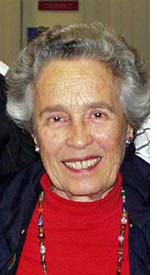By Eileen Wingard

LA JOLLA, California — It was pretty remarkable that Tchaikowsky’s monumental Symphony #4, with its opening horn fanfare of Fate and its finale, often taken at break-neck speed, was successfully tackled by TICO, the Tifereth Israel Community Orchestra.
Sure, there were a few places that barely held together, but the beautiful solo playing of principal oboist, Ron Fox; principal bassoon, Jonathan Omens; principal clarinet, Joe Stein; and principal flute Ken Kahan brought out the plaintive Tchaikovskian melodies.
The brass also shone throughout, with bright sounding trumpets and well-focused trombones and tubas. The strings were outstanding in the pizzicato passages of the third movement and, with the last movement taken at a more reasonable speed, played the scale passages with precision.
The concert opened with TICO zipping through the familiar Overture to Zampa by Ferdinand Herold. It was followed by two unfamiliar works, Five Bagatelles by Gerald Finzi and Concertpiece in D Minor, opus. 114 by Felix Mendelssohn. Conductor Amos is to be commended for programming unfamiliar works deserving to be heard.
The Five Bagatelles, for solo clarinet and string orchestra, featured Robert Zelickman on clarinet. Zelickman served for many years as the principal of the San Diego Chamber Orchestra, later renamed Nova, and he taught classes and directed ensembles at UCSD. He is also the co-director of the 2nd Avenue Klezmer Ensemble.
Zelickman’s joyful flight in the syncopated opening Prelude theme and lyrical flow in the Romance, Carol and Forlana brought the Bagatelles to life. The catchy subject of the last movement, Fughetta, was jazzy, with up-beat humor as it was tossed from soloist to the various string sections.
Finzi was a member of an Italian-Jewish family, immortalized in the 1970 movie, The Garden of the Finzi-Continis. Gerald Finzi fortunately managed to escape to England where he became a well known British composer.
For the next piece, Concertpiece, Joe Stein, principal clarinet of TICO, explained its origins. It was published after Mendelssohn’s death. Apparently, it was written in a single day and as a jestful exchange for dumplings and strudel, to be produced during the same length of time. Although composed for clarinet and basset horn (an instrument whose range is halfway between a clarinet and a bass clarinet), he and Zelickman played it on clarinet and bass clarinet.
Zelickman was outstanding on bass clarinet in all three movements. Stein, whose daytime work is as a cardiologist, sounded particularly beautiful in the middle slow movement, Andante. Although a piece written as a spoof, it demonstrated Mendelssohn’s outstanding skills as one of the world’s greatest romantic composers.
The Sunday concert had a full house attending, including many youngsters. All TICO’s concerts include matinee performances which are appropriate for younger listeners.
TICO’s next concerts will be Sunday, February 5, at 4 p.m. in the First United Methodist Church of Chula Vista and Tuesday, February 7, at 7:30 p.m. at Tifereth Israel Synagogue.
*
Eileen Wingard is a freelance writer specializing in coverage of the arts. She may be contacted via eileen.wingard@sdjewishworld.com